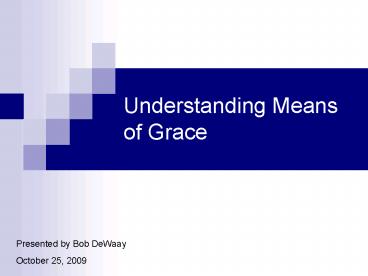Understanding Means of Grace - PowerPoint PPT Presentation
1 / 12
Title:
Understanding Means of Grace
Description:
The Influence of Charles Finney. Pietism and Arminianism. Means of Grace in Church History ... God is in charge of providence, we are not ... – PowerPoint PPT presentation
Number of Views:84
Avg rating:3.0/5.0
Title: Understanding Means of Grace
1
Understanding Means of Grace
Presented by Bob DeWaay October 25, 2009
2
The Day of Atonement
- Leviticus 161, 2
- Now the Lord spoke to Moses after the death of
the two sons of Aaron, when they had approached
the presence of the Lord and died. And the Lord
said to Moses, Tell your brother Aaron that he
shall not enter at any time into the holy place
inside the veil, before the mercy seat which is
on the ark, lest he die for I will appear in the
cloud over the mercy seat.
3
The Key Issues How do we come to God and how do
we grow in God
- Hebrews 724, 25
- but He, on the other hand, because He abides
forever, holds His priesthood permanently. Hence,
also, He is able to save forever those who draw
near to God through Him, since He always lives to
make intercession for them.
4
Key Issues
- What has God ordained?
- Do we grow in God in a completely different
manner than we come to God? - Salvation and sanctification are by grace through
faith - Faith needs an object
- Distinguishing between the cause of
sanctification and its results
5
Means of Grace in Church History
- ex opere operato (Roman Catholic View)
- The Lutheran view
- The Reformed view
- The view of mystics
- Why modern Evangelicalism has no view
- The Influence of Charles Finney
- Pietism and Arminianism
6
The difference between spiritual disciplines and
means of grace
- Spiritual Disciplines are discovered by men in
church history - Means of grace are revealed by God in the Bible
- Spiritual disciplines assume innate spiritual
abilities that can be groomed - Means of grace depend on Gods gracious working,
not human ability
7
Providence and Means of Grace
- God providentially uses all things for the
benefit of His elect (Romans 828) - God is in charge of providence, we are not
- We need to know what God has ordained and come to
Him on His terms - Mystics presume on Gods providence and take
matters into their own hands
8
What has God ordained?
- Acts 241, 42
- So then, those who had received his word were
baptized and that day there were added about
three thousand souls. They were continually
devoting themselves to the apostles' teaching and
to fellowship, to the breaking of bread and to
prayer.
9
Does the New Testament outside of Acts teach the
same means of grace?
- The Word of God 2Timothy 316, 17
- Baptism Matthew 2818-20
- Fellowship Hebrews 1025
- The Lords Supper 1Corinthians 1126
- Prayer Hebrews 416
- All means of grace are designed to humble us and
point us to our need for Gods gracious work
James 46
10
Damages to the evangelical movement due to lack
of means of grace
- Christianity became focused on motivating people
to make better decisions - Psychology was brought into Christian education
- No longer did the Word of God have a unique and
necessary place - Unbiblical practices were given a place next to
what God ordained with no distinction - In many cases, the Word of God and ordinances
were fully removed from the church
11
Damages to the evangelical movement due to lack
of means of grace
- Pietistic groups tend to seek sanctification by
higher order experiences - Legalism abounds when human ability becomes the
key theological idea - Feeling closer to God substitutes for drawing
near to God. - Nature eats up grace (Schaeffers terminology)
12
(No Transcript)































